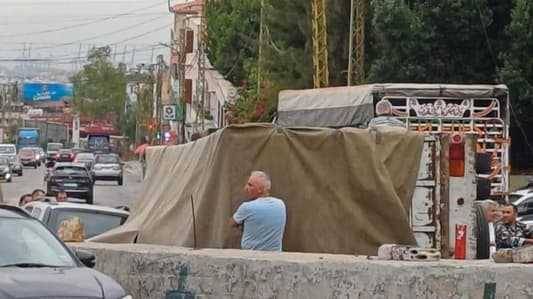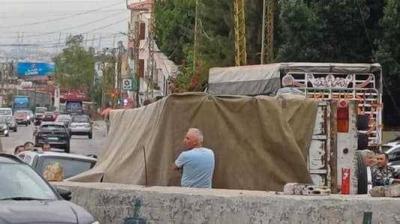A delegation of MPs visited the Mar Antonios Church in Kahaleh to offer condolences for the killing of Fadi Bajani. The delegation included MPs Mark Daou, Sami Gemayel, Ghassan Hasbani, Michel Moawad, George Adwan, Selim Saadeh, Michel Douaihi, Said Asmar, Adib Abd al-Masih, Elias Hankash, Nadim Gemayel, and Nazih Metni. The MPs expressed their solidarity with the citizens of Kahaleh, stating that they were subjected to a “blatant and militia-like aggression” in front of the security and military agencies, which failed to exercise their firm and reassuring role.
They pointed out that what happened yesterday in Kahaleh represented a dangerous political and security crossroads, clearly demonstrating that coexistence between the state and "Hezbollah's mini-state" has become impossible, and that the continued cover-up of the party's actions is undermining the state, the people, and institutions.
The delegation noted, “Words of condolence are no longer sufficient for the people of Kahaleh, and the rhetoric of condemnation and denunciation is inappropriate given the severity of Hezbollah's actions against the sovereignty of the state and its institutions.” They confirmed they are in the process of extensive communication with opposition forces to reassess the confrontation with the party and its allies comprehensively, aiming to launch a new stage of a complete national, political, and popular confrontation.
The Kahaleh incident stirred sharp reactions, with member of the "National Moderation" bloc MP Walid Baarini calling on everyone to conduct a rapid review of their performance and discourse, warning that the rift in Lebanese society does not bode well, and what was witnessed in recent hours is the seed of a strife that could explode at any moment, being deadly for Lebanon and all Lebanese without exception.
Former President Michel Aoun stated that fate had determined the events in Kahaleh yesterday, and their consequences had escalated, with incitement and exploitation potentially turning it into an entrance to a strife that begins but does not end. He lamented that Lebanon again paid with the blood of its youth and offered mercy for the souls of the victims and condolences to their families.
Aoun continued, “What is required today is de-escalation instead of incitement, building bridges of trust instead of sowing the seeds of hatred, and awaiting the results of the investigation. If the structure falls, no one will be spared, especially in the circumstances surrounding us, and there is no savior in crises except for national unity, so hold onto it.”
MP Elias Hankash from the “Kataeb” bloc expressed that it has become difficult to deal with a situation dominated by visible criminals appearing on television. He stressed that Lebanon's failure is due to a political component that prevents the country's resurgence, pointing out that every period of stability is followed by a return of this component imposing its destructive language on the rhythm of Lebanese life. He said that this situation is unacceptable and that the Lebanese have nothing left to lose, demanding security forces to assert their authority firmly.
MP Ashraf Rifi emphasized that the transfer and smuggling of weapons and nitrates have not ceased across Lebanon, which undermines not only Lebanese stability but also international decisions ahead of the renewal of UNIFIL forces.
Rifi also mentioned, "The mobile killing machine has exhausted the state and made it nonexistent, covering no area or city without turning it into a bloodshed scene," considering that “the government has lost its legitimacy, and the weapons are not resistance weapons; they are directed against us, killing us every day, and we will strive to remove all illegal weapons from owners."
MP Neemat Afram issued a statement regarding the serious incidents that happened in Kahaleh and previously in Ain Ebel and other regrettable security events across Lebanon. He states that the chaos represents a catastrophic economic and social collapse amidst a political deadlock, asserting that the current environment of lawlessness and intimidation no longer warrants acceptance or continuation, calling all political parties to bear responsibility and proceed with electing a new president swiftly to restore state functionality.
Former MP Fouad Makhzoumi condemned the events in Kahaleh and called on the army, security forces, and relevant authorities to clarify matters, noting the necessity of an immediate investigation into the incident to punish those involved, emphasizing the importance of ensuring security in safe areas free from weapons.
MP Ghada Ayoub from the "Strong Republic" bloc raised questions directed at the government, asking who decided that only the Islamic resistance has the right to arm itself, who is responsible for transferring illegal weapons, and who allows the storage of explosives in state ports and airports. She emphasized the deep wounds inflicted on Lebanon, stating, “We are wounded, but our Lebanon will come.”
MP Michel Douaihi stated that “what remains of the Lebanese state and its institutions fell yesterday with the truck’s collapse,” stressing that escalating tensions will ignite situations further.
Former Minister Richard Kouyoumjian stated that the situation in Ain Ebel, Kahaleh, and returning to square one highlights a choice between lawlessness and a republic, urging people to reject the hellish control of Iran’s party over Lebanon.
Former MP Fares Souaid remarked that Kahaleh yesterday exposed the political and media battle led by Lebanon prior to the UN Security Council session regarding the renewal of UNIFIL, emphasizing that the incident reveals Lebanon's non-compliance with Security Council Resolution 1701.
Former MP Nabil Nicola asserted that what transpired yesterday dealt a fatal blow to the remaining supportive environment for the party among Lebanese Christians and those believers in the state-building process.
The “Lady of the Mountain” gathering, during its special meeting, asserted that the incident in Kahaleh marked a collapse of the Lebanese state’s authority and that the army’s role goes beyond merely ignoring Hezbollah's weapons but into protecting them under government directives.
Lastly, the Maronite League and the Lebanese National Meetings condemned the attack on Kahaleh and called for immediate reforms and thorough investigations, stressing the necessity of restoring the rule of law and national unity among the Lebanese people to prevent the recurrence of such tragic events in the future.




